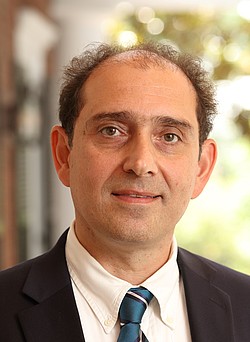Nikos Sidiropoulos
Title
Canonical Identification: A Principled Alternative to Neural Networks
Abstract
Deep neural networks are currently the most popular method for learning to mimic the input-output relationship of a generic nonlinear system, as they have proven to be very effective in approximating complex, highly nonlinear functions.
However, we still don't understand why neural networks work as well as they often do, choosing the right architecture is often an art, and, at the end of the day, the results are hard to interpret. All this goes against the very foundation of our education: to think and design starting from basic principles.
In this talk, I will discuss a principled alternative to neural networks -- one that is readily understood by engineers, and a posteriori may even seem profound. This is based on tensor principal components -- or, more precisely, low-rank tensor approximation, but used in a very different way, to model a nonlinear function of any nonlinearity order.
The approach has many advantages: it is `universal', intuitive, interpretable, comes with theoretical guarantees, and it even works with incomplete input data. The effectiveness of the approach is illustrated using standard benchmark datasets, and a challenging student grade prediction task.
About the Speaker
https://engineering.virginia.edu/faculty/nikolaos-sidiropoulos
Nikos Sidiropoulos earned his Ph.D. in Electrical Engineering from the University of Maryland College Park, in 1992. He has served on the faculty of the University of Virginia, University of Minnesota, and the Technical University of Crete, Greece, prior to his current appointment as Chair of ECE at UVA.
His research interests are in signal processing, communications, optimization, tensor decomposition, and factor analysis, with applications in machine learning and communications.
He received the NSF/CAREER award in 1998, the IEEE Signal Processing Society (SPS) Best Paper Award in 2001, 2007, and 2011, served as IEEE SPS Distinguished Lecturer (2008-2009), and as Vice President - Membership of IEEE SPS (2017-2019). He received the 2010 IEEE Signal Processing Society Meritorious Service Award, and the 2013 Distinguished Alumni Award from the University of Maryland, Dept. of ECE. He is a Fellow of IEEE (2009) and a Fellow of EURASIP (2014).





